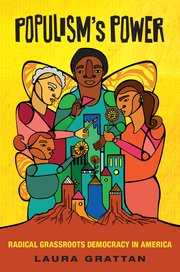Book Review: Populism’s Power: Radical Grassroots Democracy in America by Laura Grattan
‘Populism’ has often been used as a pejorative term for a ‘paranoid’, anti-democratic style of politics. But is this the only way of understanding its history? In Populism’s Power: Radical Grassroots in America, Laura Grattan argues that this neglects a different kind of populism in the USA: democratic, egalitarian, radical, rebellious and unifying. This book offers a lively and engaging take on contemporary populist movements, but reminds us that populism’s darker side remains powerful despite its democratising aspirations, writes Jon Dean.
Populism’s Power: Radical Grassroots Democracy in America. Laura Grattan. Oxford University Press. 2016.
At a time when the political classes are trying to come to terms with the success of Donald Trump’s campaign to be the Republican nominee for the US Presidential Elections, Laura Grattan’s book on the power of populism as a political force could not be better timed. The irony about Trump’s supposed ‘populist’ ascendancy is, of course, that he is deeply unpopular, the least popular candidate of either of the major US political parties on record. And when social media both turns simplicity into a virtue and not only enables the spread of conspiracy theories but has also made believing in them a badge of honour, it is telling that Grattan quotes Richard Hofstadter early on, when he labels populism a ‘paranoid style’ of politics endemic to US culture. Such a view sees populism as anti-democratic, the howling voices left behind by globalisation hanging onto privileged cultural and racial power, insecure but unwilling to admit it. Right-wing, anti-democratic, anti-decency movements such as the one that has built up around the vapid demagogue Trump make us question what faith we can place in populist uprisings.
Grattan has some sympathy for this, but her central argument in Populism’s Power: Radical Grassroots Democracy in America is that there is another populism: a democratic, radical and rebellious populism that wants to engage with a wide variety of people across social borders. This populism – present, Grattan argues, in the practices of agitators for the New Deal, Civil Rights and the New Left – seeks to act in pluralistic, egalitarian ways to enable the sharing of power, particularly at a time when democratic and civic action is under threat from the rise of corporate financial power and the selling off of the public sphere. Grattan fears that lazy dismissals of populism feed into this de-democratisation, swelling a collective despair that things can never be any better, Instead, she sees in the USA’s populist tradition a persistent democratising aspiration. In an argument aligned with some aspects of anarchist political theory, Grattan positions populism as a force which can animate popular sovereignty, and which encourages ordinary people to exercise more power over their everyday lives.
The book begins by tackling the elephant in the room head on: why are liberal scholars so dismissive of populism, to the extent that ‘populist nonsense’ is such a well-worn and derisory accusation? Grattan places critics of populism on a spectrum, from those who feel populists ‘stir up faith in the impossible unity of popular will’, achieved only when the checks and balances of liberal democracy (the protection of minority views, separation of powers, the rule of law) are diminished, with antidemocratic backlashes; or, more sympathetically, as an apolitical and episodic expression of unrest, indicating that a certain policy shift is not working. This is a well-expressed and clearly argued context-setting introduction to one of the central questions about populism.

Image Credit: Occupy Wall Street Sign, Liberty Plaza, NYC, 2011 (Eden, Janine and Jim CC 2.0)
Otherwise, Populism’s Power is structured largely chronologically: after a lengthy theoretical chapter, the book moves onto detailing the Populist revolt of US agrarians in the nineteenth century, the role of cultural markers of populist imagery in advertising and modern populist movements from the Right and the Left, and concludes with looking at smaller social movements that are attempting to cross boundaries of inclusivity in how they operate.
I found the first chapter covering populism’s position in academic theory and discourse very hard to grasp, and I had to start several times to get through it. The ambition in trying to tie together many different traditions in this section is to be applauded, but I found it unwieldy and hard to follow. As a result, I would have difficulty recommending the whole of the book to students as much of the writing suffers from academic opacity. However, Populism’s Powerdoes come alive in the chapter on Occupy Wall Street and the Tea Party, two contemporary movements that Grattan analyses through a populist prism.
Grattan’s writing flourishes when discussing these two more recent movements. She situates the Tea Party within the strange political geography of the American Right, as a movement which was simultaneously a response to corporate malfeasance, big government intervention and perceived welfare state dependency among ethnic minorities; a response both to the election of the USA’s first black President, but also the bank bailout plans of George W. Bush. Writing of the ‘feedback loop’ of Fox News, conservative Talk Radio and the blogosphere, Grattan addresses how the Tea Party’s expression of anger privileges white, Christian nationalism as the voice of populism in the USA. ‘What the Tea Party make legible are dominant norms regarding who can perform anger in America and under what circumstances.’
Grattan is obviously critical of the Tea Party, seeing its members’ failure to imagine a form of democratic emancipation that doesn’t entail their own cultural supremacy as a reason they have failed to realise the ‘independence’ they supposedly sought. In this vein, and to end as we began with Trump, Grattan borrows from Lauren Berlant’s Cruel Optimism the notion of populism’s cruel aspirations, where demagogues displace people’s aspiration for power and democracy:
In cases such as these, when people surrender their aspirations to a strong leader, or to an impossible ideal of self-mastery, they may very well feel power vicariously, but they also end up reinforcing their own disempowerment.
Grattan writes of the ‘magical moment’ of Occupy Wall Street, of its ability to bring people together and to challenge existing hierarchies (although she does reference the racial inequalities within the movement). But the most important thing she notes for our current political mess is how successful the Tea Party was at getting its politicians elected and in shifting US politics to the right. It may have been a centralising force, it may have needed the echo chamber of the media to keep it going and it may have ‘Astro-turf’ tendencies where its key funders were hidden, but it was quite effective at reinforcing, rather than challenging, neoliberal democracy. While Grattan wants us to recognise populism’s democratising aspirations, this book makes clear that its darker side is still very powerful.
—
Note: This review gives the views of the author, and not the position of the Democratic Audit blog, or of the London School of Economics. It originally appeared on the LSE Review of Books. Please read our comments policy before posting.
—
Jon Dean is a lecturer in politics and sociology at Sheffield Hallam University. He received his PhD from the University of Kent, focusing on the role of social class in youth volunteering. He writes about charity, inequality and creative qualitative research methods. Read more reviews by Jon Dean on the LSE Review of Books.

 Find this book:
Find this book: 



 Democratic Audit's core funding is provided by the Joseph Rowntree Charitable Trust. Additional funding is provided by the London School of Economics.
Democratic Audit's core funding is provided by the Joseph Rowntree Charitable Trust. Additional funding is provided by the London School of Economics.
Book Review: Populism’s Power: Radical Grassroots Democracy in America by Laura Grattan https://t.co/S2pf1ImEyt
Book Review: Populism’s Power: Radical Grassroots Democracy in America by Laura Grattan https://t.co/1iyC70fFBw
Book Review: Populism’s Power: Radical Grassroots Democracy in America by Laura Grattan https://t.co/A68kObWgsv
Book Review: Populism’s Power: Radical Grassroots Democracy in America by Laura Grattan https://t.co/1iyC6ZY4JY
Book Review: Populism’s Power: Radical Grassroots Democracy in America by Laura Grattan https://t.co/8lqsCr8WCg https://t.co/eVBLYyTceE